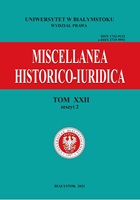The Right to Participate in the Consultations on the Participatory Budget in the Light of Legislation and the Case Law of Administrative Courts in Poland
The Right to Participate in the Consultations on the Participatory Budget in the Light of Legislation and the Case Law of Administrative Courts in Poland
Author(s): Ewa Lotko, Urszula Zawadzka-PąkSubject(s): Sociology of Law, Court case, Administrative Law
Published by: Wydawnictwo Uniwersytetu w Białymstoku
Keywords: participatory budgeting; case law; resident; Poland;
Summary/Abstract: In the practice of the Polish local and regional government, participatory budgeting has been used since 2011, and was the first one introduced in Sopot. It is a form of consultation with residents on the allocation of a portion of the budgetary expenses of a unit of the local or regional government, most often a city. This is a special type of procedure in which residents participate in the creation of the budget of a city (municipality), thereby jointly determining the distribution of a certain pool of public funds. In the first years of the application of participatory budgeting in Poland, a very general legal authorization was used to allow consultations with residents. It was only after several years of grassroots use of participatory budgeting that it was regulated in the Polish legal system in the Act of January 11, 2018 amending certain acts. Since then, it has become a mandatory form of public consultation in cities with district rights. The procedure for participatory budgeting in municipalities is generally regulated in Article 5a of the Act on the commune-level local government. The application of participatory budgeting in Poland has resulted in an extensive case law of administrative courts, hence the purpose of this paper is to determine the group of those entitled to participate in public consultations on participatory budgeting in light of the law and the case law of administrative courts. Using the dogmatic-legal method enabled a positive evaluation of the adopted research. hypothesis that the provisions of local law that designate the group of entities entitled to participate in participatory budgeting procedure is restrictive compared to the provisions of the applicable statute.
Journal: Miscellanea Historico-Iuridica
- Issue Year: 22/2023
- Issue No: 2
- Page Range: 191-220
- Page Count: 30
- Language: English

